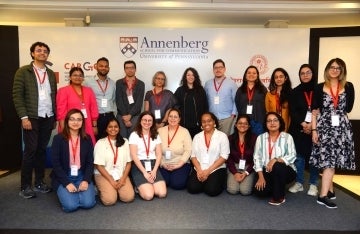Annenberg Students Win 2016 Ackoff Fellowships
Doctoral students Natalie Herbert, Stella Lee, Sijia Yang, and Lori Young will use the award to pursue their dissertation work.

Photo Credit: University of Pennsylvania
Annenberg doctoral students Natalie Herbert, Stella Lee, Sijia Yang, and Lori Young have received the Russell Ackoff Doctoral Student Fellowship Award for 2016 from the Wharton Risk Management and Decision Processes Center.
The research fellowship is named in honor of Russell Ackoff, Professor Emeritus of Management Science, whose work was dedicated to furthering the understanding of human behavior in organizations. Made possible by an endowment from the Anheuser-Busch Charitable Trust, the fellowships are awarded to University of Pennsylvania doctoral students who are pursuing research in decision making under risk and uncertainty.
The Annenberg students’ projects are:
Natalie Herbert
“Durable Inequality: An Agent-ased Bargaining Model of Structural Inequality”
Abstract: Why does inequality persist despite an increasingly better-connected world? Advances in communication technologies have alleviated the difficulties of reaching across physical distances, and yet social distance between groups remains the most difficult to traverse. Could reducing barriers to social exchange create more durable forms of inequality? We investigate this puzzle with a simple model of pairwise bargaining in populations stuck in states of intergroup inequality. This model builds on previous work suggesting populations should reach stable states of equality given infinite time. We consider the implications of varying the structure of interaction networks. Our results suggest that structures with minimal connections and barriers preventing global exchange provide the reinforcement necessary for intergroup equality to emerge and diffuse in an integrated population. On the other hand, populations entrenched in intergroup inequality cannot reach equality on a reasonable timescale when they lack these repeated interactions. Fully connected populations, where communication between groups is most efficient, are also the least effective for escaping entrenched inequality.
Stella Lee
“How Do People Talk About Health Campaign Messages?: The Effect of Message Construal Level on Subsequent Conversational Content”
Abstract: Previous research has shown that health campaign message effects can be amplified or dampened depending on the interpersonal communication around those messages. What has been less examined however is the mechanism by which different types of message topics or features can influence the way people talk about these messages or the target behavior. This project examines message construal level as a mechanism that can influence subsequent conversations after exposure to messages. Specifically, it is hypothesized that messages with high (versus low) construal level characteristics would induce more talk about desirability aspects of a behavior (i.e., why one should carry out a behavior) and more linguistically abstract talk. On the other hand, messages with low construal level characteristics would elicit more talk about the feasibility aspects of a behavior (i.e., how one can carry out a behavior) and more linguistically concrete talk. Project results have the potential to provide campaign producers with the knowledge of message characteristics that will ultimately produce conversations conducive to campaign goals.
Sijia Yang
“Can Tailored Value Appeals Correct Misconceptions about Scientific Controversies and Motivate Online Commenting to Promote Consensus Among Scientists?”
Abstract: The American public’s risk perceptions of scientific issues systematically deviate from consensuses among scientists, in cases such as genetically-modified food, vaccinations, and global warming (Pew, 2015). Such deviance from a rational information-processing model for risk perception formation has prompted scholars to examine alternative theoretical accounts such as motivated information-processing and reasoning (Druckman & Bolsen, 2011; Kahan, 2013; Lewandowsky, Ecker, Seifert, Schwarz, & Cook, 2012; Taber & Lodge, 2006); and human beings’ predisposition to observe core values and moral principles represents an important source of motivation (Haidt, 2007; Ryan, 2016). A value appeal frames an issue position and a behavior as consistent or inconsistent with a cherished personal value or moral principle, hence situating the interpretation of factual information in light of one’s value structure (Blankenship, Wegener, & Murray, 2012; Nelson & Garst, 2005). For scholars interested in risk perceptions of scientific controversies, values upheld by people are typically studied as a personality trait (Kahan, Braman, Cohen, Gastil, & Slovic, 2010; Nisbet, Cooper, & Ellithorpe, 2014; Scheufele, 2014); and the persuasiveness of value appeals has yet been garnered to correct misconceptions. On the other hand, psychologists under the framework of Moral Foundations Theory (Graham et al., 2011; Haidt, 2012) have already compared tailored versus mismatched value appeals in a variety of contexts, and have shown the persuasiveness of the former (Feinberg & Willer, 2012, 2015). However, they have yet compared fact-only messages with those augmented by tailored value appeals in the context of correcting misconceptions about scientific controversies.
Lori Young
“The Influence of Poverty Discourse on the Political Attitudes and Preferences of Low-income Citizens”
Abstract: Empirical research has consistently found that public opinion does not vary a great deal across class lines, even in the domain of redistributive policy; low-income citizens often express negative attitudes about “others” living in poverty and oppose the very policies designed to support them, and on which they rely. These views are robust despite stagnating poverty rates and a precipitous increase in both economic inequality and the depth of poverty over the past several decades. Moreover, they are not reducible to differences in education and information or partisanship and ideology. I refer to the observed consensus of opinion across class lines as “class opinion alignment,” which has been taken by some as evidence that the political attitudes and preferences of low-income citizens are as well-represented by policymakers as are the preferences of the affluent: if opinions do not vary, there can be no representational inequality. This research questions the validity of opinions elicited in an information environment in which the subjects of political discourse are negatively portrayed and linguistically excluded. I argue that negative coverage and exclusive frames foster outgroup favoritism, increasing the propensity for low-income citizens to align their political attitudes and preferences with those of the higher income groups with whom they identify. To explore these issues I conduct a framing experiment with low-income participants in which I vary the tone and structure of a series of political vignettes about poverty and redistribution. The experiment also assesses the intervening role of subjective class identity and the moderating influence of meritocratic beliefs. This study has concrete implications for both the ways in which journalists address audiences and the lack of diversity of speakers in mainstream news. Giving voice to — or simply addressing — the subjects of poverty discourse may reduce class opinion alignment and expose representational inequalities across classes. Focusing on the nature of political discourse and intergroup psychology suggests that political opinion formation among low status groups may be psychologically adaptive, but politically maladaptive.



